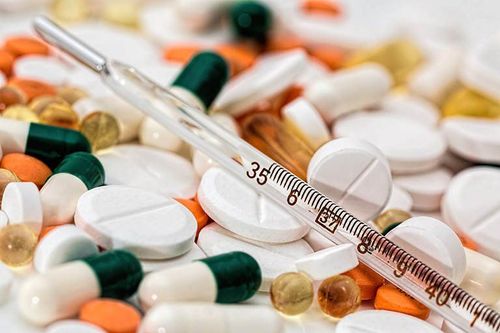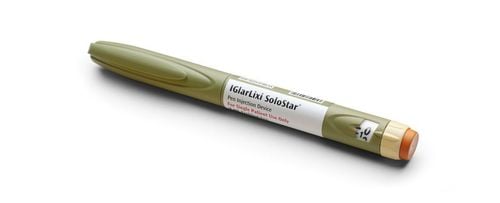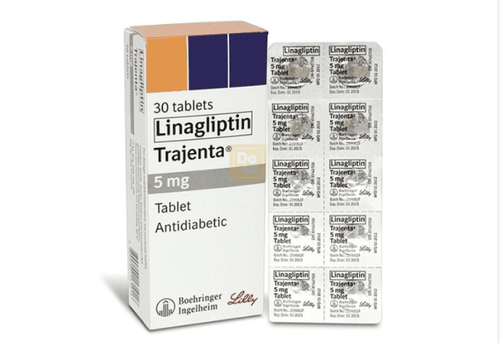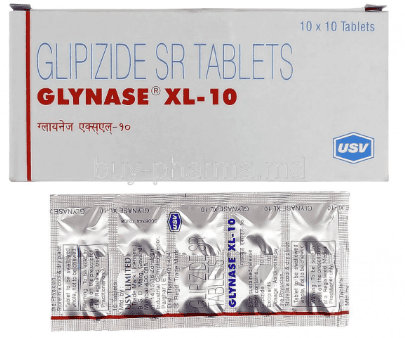This is an automatically translated article.
Sitagliptin is a new generation antidiabetic drug, acting on a different mechanism than previous antidiabetic drugs. What are the effects and contraindications of Sitagliptin 100 mg?
1. What is the effect of Sitagliptin 100mg?
Sitagliptin is a new generation antidiabetic drug. The drug has a strong, highly selective inhibitory effect on the enzyme dipeptidyl peptidase 4 (DPP-4).
Two endocrine hormones: Glucagon-like peptide-1-GLP-1 and glucose-dependent insulinotropic polypeptide (GIP) are released in the gastrointestinal tract continuously throughout the day and levels of these two hormones in blood increased after meals. These two substances are part of the body's system of regulating glucose stability. When blood glucose levels are normal or elevated, the two hormones GLP-1 and GIP increase the synthesis and release of insulin from pancreatic beta cells by activating intracellular cyclic AMP. GLP-1 also reduces glucagon secretion from pancreatic alpha cells, resulting in decreased hepatic glucose production. However, once produced, these two hormones are rapidly inactivated by the enzyme DPP-4. Sitagliptin inhibits this enzyme, thereby increasing the concentration and prolonging the action of these two hormones. Therefore, sitagliptin also acts to increase insulin release and decrease circulating glucagon.
Research shows that using the drug in patients with type 2 diabetes, when taking Sitagliptin, it will inhibit the activity of DPP-4 enzyme for 24 hours. After oral glucose administration or postprandial, this inhibitory process will increase up to 2-3 times, increasing the activity of GLP-1 and GIP in the circulation, thereby helping to reduce glucagon concentration and increase insulin response to insulin. glucose, which increases peptide C and insulin levels. But in a study in healthy people, the use of Sitagliptin did not lower blood sugar and did not cause hypoglycemia. Electrocardiography studies with healthy subjects at a dose of 100 mg did not affect the electrocardiogram, but with a dose of 800 mg, there was a change in the QT interval 3 hours after taking the drug. In patients with type 2 diabetes, a dose of 100 mg or 200 mg did not change the QT interval on the electrocardiogram.
Thanks to the drug effect, Sitagliptin is indicated for use in the following cases:
Monotherapy: Sitagliptin is indicated for use alone to treat diabetes mellitus and in combination with diet and exercise to improve blood sugar control. Combination therapy: Sitagliptin is indicated in combination with metformin, insulin, sulfonylurea... in case of treatment with a single drug in combination with diet and exercise but still unable to control blood sugar.
2. When is Sitagliptin 100 mg contraindicated?
Cases not to use Sitagliptin 100mg include:
People who are sensitive to the main active ingredient Sitagliptin or to any ingredient of the drug. Type I diabetes is also known as insulin dependent diabetes. Because of this, the body is no longer able to secrete insulin. Diabetics are suffering from ketoacidosis. Use with caution in the elderly, renal failure of all degrees, pregnant and lactating women, the elderly, people with a history of pancreatitis.
3. Some things to keep in mind when taking Sitagliptin 100 mg
When the patient takes the drug, it can also cause some side effects such as hypoglycemia, dizziness, headache, constipation, allergic reactions... In addition, side effects have been reported. It is acute pancreatitis, which if severe can lead to death. It is necessary to monitor the manifestations of possible acute pancreatitis such as nausea, vomiting, loss of appetite, prolonged abdominal pain. If pancreatitis is suspected, Sitagliptin must be discontinued and the patient should be hospitalized immediately for treatment. Acute pancreatitis usually occurs within the first 30 days of starting treatment. Risk factors include: Obesity, patients with high cholesterol and increased triglycerides in the blood. When taking the drug, it is necessary to assess renal function before and periodically. In some patients, side effects such as acute renal failure and the need for hemodialysis have occurred in some patients. It should be used with extreme caution in patients with all stages of renal failure. Follow the treatment regimen of the doctor, do not stop or change the treatment on your own. During stress due to fever, infection, after surgery, the body may lose control of blood glucose, so patients need to temporarily stop taking Sitagliptin and use insulin to control it. The application of sitagliptin therapy can be resumed when the stress-inducing episode of acute hyperglycemia has passed. For pregnant and lactating women: It has not been proven that this drug is effective and safe for these two subjects. Therefore, it should not be used and if used, the benefits and risks should be carefully weighed. Combine diet and exercise to improve health, increase the effectiveness of disease treatment. Sitagliptin 100 mg may interact with other drugs that increase, decrease the effect or increase the risk of drug toxicity. So talk to your doctor about all the medications you're taking so he can help you get the most out of them. Sitagliptin is a new generation antidiabetic drug, acting on a different mechanism than previous antidiabetic drugs. To ensure the effectiveness of treatment, patients need to take the drug according to the instructions of the doctor, professional pharmacist.
Follow Vinmec International General Hospital website to get more health, nutrition and beauty information to protect the health of yourself and your loved ones in your family.
Please dial HOTLINE for more information or register for an appointment HERE. Download MyVinmec app to make appointments faster and to manage your bookings easily.













